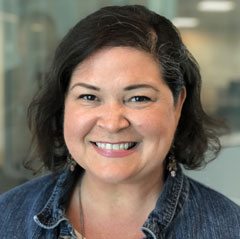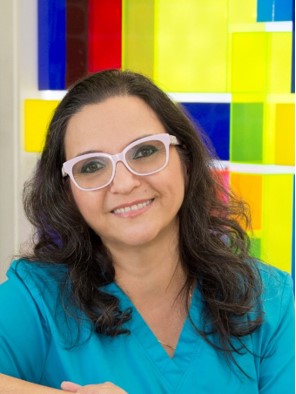Gabriela Aurora Asensi, Master of Public Health, 2021

Apr 13, 2023, 4:30 PM.
A Miami pediatric dentist pursues her MPH degree to have a greater impact on community health and to fulfill a lifelong passion to move into academia.

Dr. Gabriela Aurora Asensi needed a shift in focus. As a pediatric dentist with her own practice in Miami, she decided to pursue a master’s degree in public health with FIU to fulfill a couple of goals—to have a greater impact on her community through oral health and to one day teach at the university level.
With a full-time pediatric dentistry business to run, she needed a program that fit her schedule, and being a Miami resident, she knew of FIU’s reputation. Moreover, she noted that most medical doctors who teach also have a public health degree, and FIU's generalist public health program fit well with her trajectory.
Asensi started her Master of Public Health just before the pandemic. The bulk of her online degree program took place during the height of the COVID-19 emergency. She welcomed the distraction when her business was forced to close for two months because of state mandates.
Online learning offered her the flexibility to get coursework done, she says, and when it was safe to reopen her business to see patients, she could continue the program without an impact on her business. In 2021, she graduated.
In the following, Asensi provides a look at what her experience was like and how she is using the knowledge gained from her program.
Where do you work now, what is your title and what do you do?
I am a pediatric dentist and I provide braces for patients. Miami Children’s Smiles is my own practice.
Most of my patients are children. I’ve been in practice for 23 years. Some of my patients are young adults and they still see me.
What immediately applicable skills did you learn from your program?
I learned a lot of leadership skills like how to manage employees and the parents of my patients. The main thing I learned was to look at disease from a community standpoint and not as an individual situation. You can treat a community like you treat a patient. This program allowed me to have a zoomed-out look at why people develop cavities, what can be done and what we can do for people who have cavities. I learned to look at diseases from a different perspective.
How does your degree help you in your work?
It taught me how to be an advocate for oral health for the population at large and how to speak to stakeholders. I also was part of the American Dental Association and the Institute for Diversity in Leadership, where I created a mini-program in my office and went to local daycares to offer free oral exams to babies—they are usually not seen by a dentist. Sometimes parents don’t bring their children to a pediatric dentist until much later in age.
What was your favorite class and why?
I had several that I liked, but Health Policy was one of the best. The class taught me how to think as an advocate for oral health for the community. It learned how to talk to politicians, how they look at health, and how to speak to them about the needs of a community.
What did you learn that you did not expect?
I’m not particularly good at math and I had to take a class in statistics and that was surprising for me. How to analyze the data. I had to actually study. I had to write papers. It was hard, but the professor held weekly sessions on Zoom to help students. There was a lot of support and faculty was very approachable.
Would you recommend this program to other students?
Yes, you can do this program at your own pace. I did it in three years because I have a full-time job and only took two courses per semester. Because I was a chief of a department of dentistry, I was able to use that experience for the residency. I already had some experience in health. I was able to write a paper about my experiences and the connections between MPH and oral health. Coming from dentistry and going into public health was a great learning experience.
